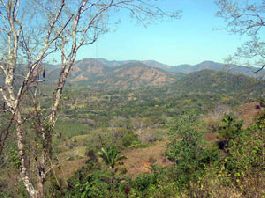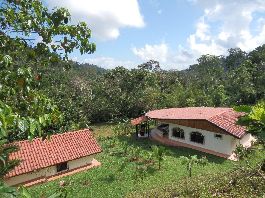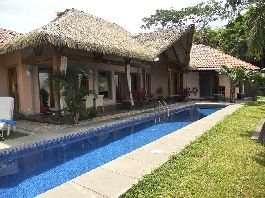Costa Rica the tax paradise in Central America
Costa Rica - the tax paradise in Central America
Companies as well as private persons only need to pay taxes on the part of their income that was generated in Costa Rica, earnings from abroad are therefore "for free". Concerning the taxation of capital, the tax rates here are far below the ones you need to pay in Europe or the US. Yes, Costa Rica is a tax paradise and is suitable for pensioners, drop outs, but also for entrepreneurs and investors. As a matter of fact, Costa Rica is looking for and canvassing investors mainly in the tourism and agriculture sectors.
Fiscal system
Officially Costa Rica was never said to be an absolute tax paradise, but for a long time the tax burden could be kept relatively small. Nowadays the tax rates are still quite moderate, but more focus is put on tax collection, nevertheless it is still very common to adjust especially private income downwards. The legal accounting regulations have always given leeway to the taxpayers and this has been used extensively, so tax authorities experienced loss of income on a regular basis.
In 1995 the government finally drew conclusions after having had to face severe problems in their finances and so enacted new laws. Especially the accounting rules were tightened as well as imminent penalty in case of violations of the new tax laws. Besides high administrative fines, tax sinners could also be criminally prosecuted and it could even happened, that the government liquidates a company by force. But in practice only the quantity of handed in tax declarations have been risen. Nevertheless, in Costa Rica the taxes are still not taken too seriously yet.
Income taxes
All individual as well as legal persons have to pay taxes for the part of their income that was generated in Costa Rica. Income achieved abroad, no matter how and where it was realized, is not subject to taxation in Costa Rica. Because of this limited tax liability, there is no double taxation in the point view of Costa Rica. There is an existing double tax agreement for example between Costa Rica and Germany, but it hasn't been ratified by neither one of those two parties yet.
The taxable income is being calculated from a gross income minus the legally defined charges (such as allowances for children and spouses, insurance premiums, operating expenses and sundry business expenditures, and so on).
The gross income contains all earnings and profits generated in Costa Rica in a fiscal year. It therefore also includes income from capital assets, real estate business and all other operations that produce any kind of revenue. No-taxable are legacies, donations and lottery winnings!
In Costa Rica the fiscal year starts October 1st and ends September 30th. The tax declaration (declaración de la renta) is due November 30th latest and has to be handed in at the tax office (Tributación Directa) that is part of the department of finance (Ministerio de Hacienda). The callable taxes need to be paid by December 30th, if not done so, additional interests and fees will be added.
Individual persons as well as companies are subject to different tax rates. Besides that, the Costarican tax law also differentiates the revenues from individual persons into income generated from employment or self-employment. For those income categories different tax tariffs will be applied with progressive developing for both. The according income and tax exemption limits are regularly adjusted to the price index of the Central Bank.
Value added tax and consumption tax
The tax authorities in Costa Rica levy a value added tax (Impuesto de Ventas) for goods and services, at the moment this is 13%.
Following goods are non-taxable:
• Goods for daily needs
• Pharmaceutical products that are listed with the Costarican health insurance for social security
• agricultural semi-finished and finished products
• Tools and equipment for agricultural use
• veterinary products
• Raw and roasted coffee
The income from the value added tax is fundamental for the Costarican tax authorities. Together with the import taxes they generate about two thirds of all the governmental income.
For some goods a tax rate of 8 to 10% is collected (Impuesto Selectivo de Consumo) and this is especially valid for most of the imported merchandise.
Transference taxes
With the transference of a property, a transference tax of 3% is due (Impuesto de Traspaso) as soon as the sales/purchase contract is being registered.
The transference tax that needs to be paid for a transfer of a car is 5% of the sales price.
Property tax
The municipal administration levies the annual property tax that often also includes the taxes for the disposal of waste if there is a house on the property. The collection of tax debts through the local authorities does still not work really well and besides that the encashment periods differ from community to community. In some communities taxes need to be paid annually, in some semiannual or even quarterly. The according municipality makes the tariffs in its sole discretion, but up to a limit of 1% of the purchase price. The property values are newly evaluated on a regular basis and so the taxes adjusted.
See also:
http://www.costaricaweb.com/business/cindetaxes.htm
http://dgt.hacienda.go.cr/tiposdeimpuestos/Paginas/default.aspx
Properties Costa Rica
- personal consulting
- indivudial assistence
- object inspection
- verification purchase object
- registers / cadastral studies
- transparent execution
- company foundation
- residencies
- bank accounts / cel phone lines
- project planning
Services
- management
- survey of land
- land and environment studies
- construction assistance
- solar systems
- reforestation
- real estate management
- dealing with authorities
- insurances
- support / advice
Local Team
- Costa Rica expert
- estate agent
- travel agancies / hotels
- lawyers / notary
- accountants / translators
- topographers / engineers
- construction companies / architects
- carpenters / electricians
- solar technicians / and so on...

















